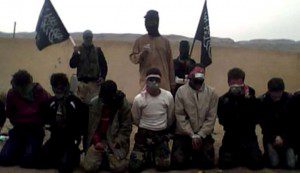Qatar, Arab League, and OIC Summit in Terrorist Denial (Israel)
Murad Makhmudov, Noriko Watanabe, and Lee Jay Walker
Modern Tokyo Times

The recent Israeli military action targeting Hamas operatives in Qatar has generated significant international fallout. In response, Qatar convened a meeting with the Arab League and the Organisation of Islamic Cooperation (OIC), which included several nations historically opposed to Israel.
Historically, slavery persisted in the Arabian Peninsula—including in Mecca—until the 1960s, with Arab involvement in the transcontinental slave trade lasting over a millennium and impacting populations across Africa, Asia, and Europe.
In present times, troubling parallels persist. ISIS continues to hold Yazidi women in captivity in Iraq, engaging in systematic sexual slavery. Meanwhile, the conflict in Yemen, fueled by sectarian and regional rivalries, has led to a humanitarian catastrophe, with various Muslim-majority nations supporting opposing sides and contributing to widespread civilian casualties. In Darfur (Sudan), reports of ethnic violence against Black African communities by Arab militias further highlight ongoing regional tensions.
Additionally, Qatar has long faced allegations of supporting extremist and sectarian groups implicated in violence across multiple countries. Despite widespread evidence, many governments—particularly within the Muslim world, such as Iraq, Libya, and Pakistan—alongside some Western nations, appear reluctant to confront the complex web of funding and ideological support that sustains these organizations. This hesitance continues to impede a unified international response to terrorism and sectarian conflict in the region.
In a 2014 article, writer Ron Prosor highlighted in The New York Times the connection between Qatar and the financing of terrorism. Prosor concerning Qatar said, “This hasn’t stopped the Persian Gulf monarchy from serving as a Club Med for terrorists. It harbors leading Islamist radicals like the spiritual leader of the global Muslim Brotherhood, Sheikh Yusuf al-Qaradawi, who issued a religious fatwa endorsing suicide attacks, and the Doha-based history professor Abdul Rahman Omeir al-Naimi, whom the United States Department of Treasury has named as a “terrorist financier” for Al Qaeda. Qatar also funds a life of luxury for Khaled Meshal, the fugitive leader of Hamas.”
Since then, Qatar and other regional actors have provided support to Sunni Islamist groups in Syria, some of which have been implicated in attacks and massacres targeting Alawites, Christians, Druze, and Kurdish communities. Concurrently, the Muslim Brotherhood has leveraged networks in Qatar, Turkey, the United Kingdom, and other countries to promote its Islamist agenda—raising serious concerns among moderate Muslim-majority states such as the United Arab Emirates, which view the group as a destabilizing force.
Henceforth, regardless of international outrage over Israel’s targeting of Hamas operatives in Qatar, many Muslim-majority countries—and several European nations—have not held Qatar and other regional actors accountable for their roles in the conflicts in Libya, Sudan, Syria, and Yemen, nor for their support of terrorist and armed groups operating in these regions.
The Gatestone Institute (Khaled Abu Toameh) reports, “Hamas leaders simply feel no pressure whatsoever from the Arabs to end the war in the Gaza Strip. That is most likely why Hamas leaders are determined to fight to the last Palestinian. From their safe homes and offices in Qatar and Turkey, Hamas leaders continue to glorify the Palestinian ‘resistance’ and threaten Israel with more terrorism.”
The draft resolution by Qatar, the Arab League, and the OIC apparently condemns Israel for “hostile acts including genocide, ethnic cleansing, [and] starvation,” which threatens the “prospects of peace and coexistence.”
The BBC reports, “Earlier, Qatari Prime Minister Mohammed bin Abdulrahman bin Jassim al-Thani urged the international community to stop applying ‘double standards’ and to punish Israel. Hence, the irony is astonishing concerning the regional role of Qatar in war and terrorism.
President Benjamin Netanyahu of Israel said, “We sent a message to the terrorists – you can run but you can’t hide.”
Many of the nations supporting this draft are themselves entangled in the very conflicts they condemn—whether through direct involvement in wars in Libya, Sudan, Syria, and Yemen, or, as in Qatar’s case, through the funding of terrorist networks and support for the Muslim Brotherhood. This selective outrage mirrors a broader historical pattern: just as the Arab Muslim slave trade endured for over a millennium and only officially ended in Mecca in the 1960s, today’s atrocities—such as the mass killings of Black Africans in Darfur, sectarian violence in Yemen and Syria, and ethnic persecution of Kurds—are often overlooked or downplayed. In many power centers across the region, the ideology of Islamism continues to dominate, despite its role in perpetuating violence and repression. At the heart of this double standard lies a deeper issue: Israel’s status as a non-Muslim state. Meanwhile, nations like Iran and Qatar continue to incite hostility against Jews—further underscoring how entrenched narratives remain unchanged.

Modern Tokyo News is part of the Modern Tokyo Times group
http://moderntokyotimes.com Modern Tokyo Times – International News and Japan News
http://sawakoart.com – Sawako Utsumi’s website and Modern Tokyo Times artist
https://moderntokyonews.com Modern Tokyo News – Tokyo News and International News
PLEASE JOIN ON TWITTER
https://twitter.com/MTT_News Modern Tokyo Times
PLEASE JOIN ON FACEBOOK